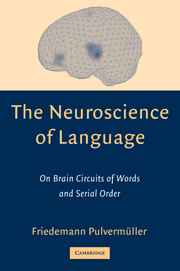Book contents
- Frontmatter
- Contents
- Preface
- The Neuroscience of Language
- 1 A Guide to the Book
- 2 Neuronal Structure and Function
- 3 From Classic Aphasia Research to Modern Neuroimaging
- 4 Words in the Brain
- Excursus E1 Explaining Neuropsychological Double Dissociations
- 5 Regulation, Overlap, and Web Tails
- 6 Neural Algorithms and Neural Networks
- 7 Basic Syntax
- 8 Synfire Chains as the Basis of Serial Order in the Brain
- 9 Sequence Detectors
- 10 Neuronal Grammar
- 11 Neuronal Grammar and Algorithms
- Excursus E2 Basic Bits of Neuronal Grammar
- Excursus E3 A Web Response to a Sentence
- 12 Refining Neuronal Grammar
- Excursus E4 Multiple Reverberation for Resolving Lexical Ambiguity
- Excursus E5 Multiple Reverberations and Multiple Center Embeddings
- 13 Neurophysiology of Syntax
- 14 Linguistics and the Brain
- References
- Abbreviations
- Author Index
- Subject Index
Excursus E1 - Explaining Neuropsychological Double Dissociations
Published online by Cambridge University Press: 15 December 2009
- Frontmatter
- Contents
- Preface
- The Neuroscience of Language
- 1 A Guide to the Book
- 2 Neuronal Structure and Function
- 3 From Classic Aphasia Research to Modern Neuroimaging
- 4 Words in the Brain
- Excursus E1 Explaining Neuropsychological Double Dissociations
- 5 Regulation, Overlap, and Web Tails
- 6 Neural Algorithms and Neural Networks
- 7 Basic Syntax
- 8 Synfire Chains as the Basis of Serial Order in the Brain
- 9 Sequence Detectors
- 10 Neuronal Grammar
- 11 Neuronal Grammar and Algorithms
- Excursus E2 Basic Bits of Neuronal Grammar
- Excursus E3 A Web Response to a Sentence
- 12 Refining Neuronal Grammar
- Excursus E4 Multiple Reverberation for Resolving Lexical Ambiguity
- Excursus E5 Multiple Reverberations and Multiple Center Embeddings
- 13 Neurophysiology of Syntax
- 14 Linguistics and the Brain
- References
- Abbreviations
- Author Index
- Subject Index
Summary
The cortex may be an associative memory in which correlation learning establishes discrete distributed functional webs. It is important to ask how this view relates to clinical observations, in particular to the neuropsychological double dissociations seen in aphasic patients. Here is an example of such a double dissociation. Patient A exhibits severe deficits in producing oral language (Task 1), but much less difficulty in understanding oral language (Task 2). Patient B, however, presents with the opposite pattern of deficits – that is, only relatively mild language production deficits, but substantial difficulty in comprehending spoken language. Briefly, Patient A is more impaired on Task 1 than Task 2, whereas Patient B is more impaired on Task 2 than Task 1.
Clearly, the explanation of neuropsychological syndromes and, in particular, of double dissociations is an important issue for any model of brain function and, therefore, a brief excursus may be appropriate here. It was once argued that the existence of a double dissociation demonstrates, or strongly suggests, the presence of modules differentially contributing to specific aspects of the tasks involved (Shallice, 1988). A module would be conceptualized as a largely autonomous information processor (see also Section 6.2). A standard explanation of a double dissociation, therefore, is that two modules are differentially involved in the two tasks (1 and 2), and that one of them is selectively damaged in each of the patients (A and B).
Information
- Type
- Chapter
- Information
- The Neuroscience of LanguageOn Brain Circuits of Words and Serial Order, pp. 66 - 73Publisher: Cambridge University PressPrint publication year: 2003
